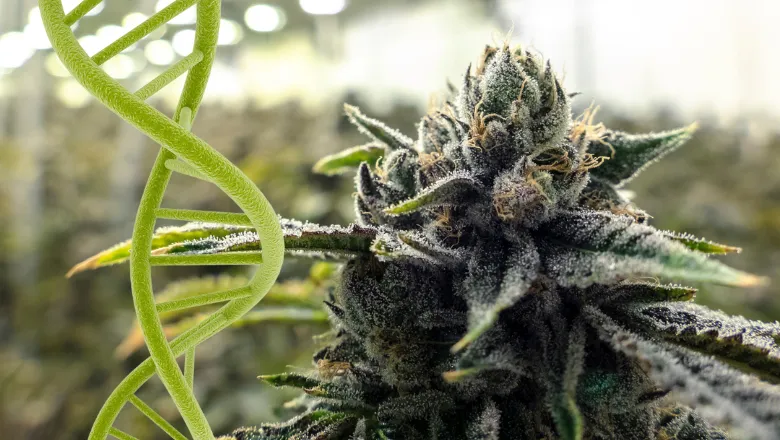In a pioneering study published in Molecular Psychiatry, researchers have uncovered evidence that frequent use of high potency cannabis leaves a distinct signature on DNA. This discovery offers valuable insights into the biological impact of cannabis use, particularly on mental health.
Summary: Researchers have discovered that frequent use of high potency cannabis is associated with unique changes in DNA methylation, particularly affecting genes related to immune function and energy production. This groundbreaking study provides new insights into how cannabis use may influence biological processes and mental health.
Estimated reading time: 5 minutes
The DNA Signature of Cannabis Use
The study, conducted by researchers at King’s College London and the University of Exeter, is the first to suggest that using high potency cannabis – defined as having a Delta-9-tetrahydrocannabinol (THC) content of 10 percent or more – results in measurable changes to DNA methylation.
DNA methylation is a chemical process that alters how genes function without changing the DNA sequence itself. It’s considered a crucial factor in understanding how environmental influences, such as substance use, can impact gene activity and potentially affect mental health.
Professor Marta Di Forti, senior author of the study from King’s Institute of Psychiatry, Psychology & Neuroscience (IoPPN), emphasized the significance of these findings:
“With the increasing prevalence of cannabis use and more availability of high potency cannabis, there is a pressing need to better understand its biological impact, particularly on mental health. Our study is the first to show high potency cannabis leaves a unique signature on DNA related to mechanisms around the immune system and energy production.”
Implications for Mental Health
The research also revealed that the effect of cannabis use on DNA differs between individuals experiencing their first episode of psychosis and users who have never experienced psychosis. This finding suggests the potential for DNA blood tests to help identify cannabis users at risk of developing psychosis, which could inform preventative approaches.
Dr. Emma Dempster, Senior Lecturer at the University of Exeter and the study’s first author, explained:
“This is the first study to show that frequent use of high-potency cannabis leaves a distinct molecular mark on DNA, particularly affecting genes related to energy and immune function. Our findings provide important insights into how cannabis use may alter biological processes.”
The Study Methodology
The researchers analyzed blood samples from 682 participants across two cohorts: the GAP study, consisting of patients with first episode psychosis in South London and Maudsley NHS Foundation Trust, and the EU-GEI study, which included patients with first episode psychosis and healthy controls across multiple European countries and Brazil.
Most of the cannabis users in the study used high-potency cannabis more than once a week and had first used cannabis at age 16, on average. The study controlled for factors such as tobacco use, which is known to have its own effects on DNA methylation.
Key Findings and Future Research
The research identified changes in genes related to mitochondrial and immune function, particularly the CAVIN1 gene, which could affect energy and immune response. These changes were not explained by the well-established impact that tobacco has on DNA methylation.
Professor Di Forti highlighted the need for further research:
“Future research needs to explore if the DNA signature for current cannabis use, and in particular the one of high potency types, can help identify those users most at risk to develop psychosis, both in recreational and medicinal use settings.”
As cannabis legalization continues to spread globally, understanding its biological impacts becomes increasingly crucial. This study provides a significant step forward in unraveling the complex relationship between cannabis use, DNA, and mental health.
Quiz
- What is the main finding of the study? a) High potency cannabis causes psychosis b) Cannabis use alters DNA sequence c) High potency cannabis leaves a distinct signature on DNA methylation d) Cannabis use only affects the brain
- What is DNA methylation? a) A process that changes the DNA sequence b) A chemical process that alters how genes function without changing the DNA sequence c) A type of cannabis d) A method of extracting THC
- According to the study, which gene was particularly affected by cannabis use? a) THC gene b) Psychosis gene c) CAVIN1 gene d) Cannabis gene
Answers:
- c
- b
- c
Glossary of Terms
- DNA methylation: A chemical process that can alter gene expression without changing the DNA sequence.
- THC (Delta-9-tetrahydrocannabinol): The main psychoactive component in cannabis.
- Epigenetic change: Alterations in gene expression that do not involve changes to the underlying DNA sequence.
- Psychosis: A mental health condition characterized by a disconnection from reality.
- Mitochondrial function: Processes related to energy production in cells.
- First episode psychosis (FEP): The first time an individual experiences psychotic symptoms.
Enjoy this story? Get our newsletter! https://scienceblog.substack.com/
If our reporting has informed or inspired you, please consider making a donation. Every contribution, no matter the size, empowers us to continue delivering accurate, engaging, and trustworthy science and medical news. Independent journalism requires time, effort, and resources—your support ensures we can keep uncovering the stories that matter most to you.
Join us in making knowledge accessible and impactful. Thank you for standing with us!

